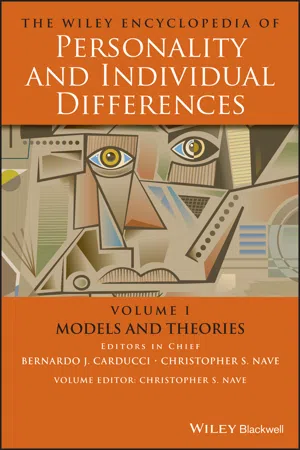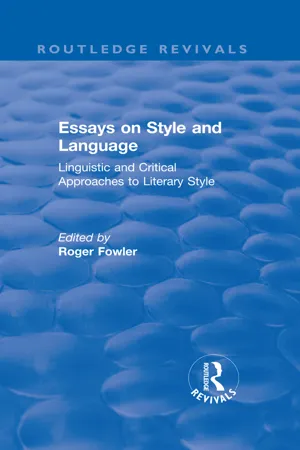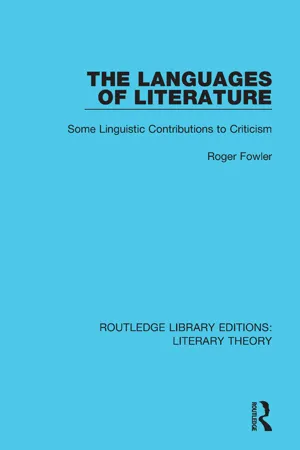Languages & Linguistics
Character Analysis
Character analysis involves examining the traits, motivations, and behaviors of characters in literature or other forms of storytelling. This process often includes studying their relationships with other characters and their development throughout the narrative. By analyzing characters, linguists can gain insights into the ways in which language is used to convey personality, emotions, and social dynamics within a text.
Written by Perlego with AI-assistance
Related key terms
1 of 5
3 Key excerpts on "Character Analysis"
- (Author)
- 2020(Publication Date)
- Wiley(Publisher)
style primarily consists of function (i.e. syntactical) words (e.g. prepositions, conjunctions). Language content typically include words classified as nouns, regular verbs, and most adjectives and adverbs – words that generally have meaning even without context, such as “happiness” or “family.” Function words primarily include pronouns, prepositions, articles, conjunctions, and auxiliary verbs, among other classes of linguistic particles – words that do not possess inherent meaning without context, such as “of” and “the.”Function and content words often show different personality correlates. Content words most commonly exhibit statistical relationships to explicitly‐accessible self‐information, such as sociability and trait affect, whereas function words are typically predictive of lower‐level personality processes, including things like automatic cognitive and attentional processes.Language Analysis Methods and Techniques
Qualitative Methods
Language analysis in psychology dates back to the early beginnings of modern psychology. The earliest research methods of psychological language analysis were qualitative methods. Early work on language and personality principally consisted of case studies that emphasized the deep interpretation and discovery of hidden meanings in a person’s language. Such methods include classical projective tests developed by Rorschach and others to discover people’s thoughts, intentions, and motives from their verbalized interpretations of abstract images such as inkblots, as well as Murray’s Thematic Apperception Test (TAT), which was designed to reveal information about a person’s implicit motivational processes.- eBook - ePub
Routledge Revivals: Essays on Style and Language (1966)
Linguistic and Critical Approaches to Literary Style
- Roger Fowler(Author)
- 2017(Publication Date)
- Routledge(Publisher)
1 Linguistic Theory and the Study of LiteratureIN THIS CENTURY, students of language and literature have witnessed the development of a new discipline, linguistics, to a state of relative maturity. The development has been marked by a progressive growth in the number of books and persons attached to the subject, and so it is ceasing to be something rather esoteric, and is finding a place among the established humanities. Unfortunately, one feels that the integration of linguistics with its natural companion, literary criticism, has been hindered by something unsympathetic in the way the linguist has presented himself. The image is sometimes an unhappy one: pretension of scientific accuracy; obsession with an extensive, cumbersome and recondite terminology; display of analytic techniques; scorn of all that is subjective, impressionistic, mentalistic—in a word, ‘prelinguistic’. But this view of the linguist—armed to the teeth and potentially destructive by his attack on a sensitive work of art—cannot be substantiated: it rarely has any factual basis in the actual practices and interests of linguists.Just as there is no single thing ‘literary criticism’ which produces a ‘critic’ who can be identified by reference to his methods and beliefs, so linguistics as a homogeneous, evangelical, operative-producing subject does not exist. We cannot altogether predict a linguist’s attitude to his analysis of a text. There is no one linguistic method with easily characterizable modes of operation and endproducts. Certain fundamentals are common to all who call themselves linguists: the beliefs that language changes, is patterned, is only conventionally connected with the outside world, and has an analysable form, for example. But when we look closer we find fewer agreements on details. The history of linguistics reveals tentative effort, revisions of opinion, lack of universal continuous progress. There have been, as in the development of any new discipline, independent schools of linguists: following Bloomfield, Chomsky, Hjelmslev, for example. There is diversification within the field of language studies independent of adherence to general theories: a linguist to the world may be, to his colleagues, a phonetician, dialectologist, grammarian, lexicographer. There is disagreement on the relationship between linguistics and other subjects: is it a social science, a physical science, a humanity? is it most closely related to literary criticism, sociology, psychology, philosophy? We cannot, it seems, be sure what is meant by ‘linguistics’ in a title like that of the present chapter, nor what the author intends to produce when he places linguistics vis-a-vis - eBook - ePub
The Languages of Literature
Some Linguistic Contributions to Criticism
- Roger Fowler(Author)
- 2016(Publication Date)
- Routledge(Publisher)
Essays on Style and Language, 10–11) it has, like other formally distinctive texts, essentially distinctive contexts which the linguist no less than the critic must study. That is, the investigator must be curious about the extra-linguistic features which condition the distinctive style of a literary work. As for the applicability of different linguistic models, this is obviously variable. The old Bloomfieldian linguistics in its classic Immediate Constituent analysis phase, or Hallidayan scale-and-category grammar, both concentrating on relatively ‘small’ units, can have little to say about the linguistic structure of extended texts. Nor can we expect to learn much through linguistics about kinds of poetry where metaphor is dominant until we have proper tools for lexical analysis. It apparently needs repeating over and over again that there is no one linguistics providing a ready-made set of procedures or formulae perfectly apt for all kinds of texts. The appropriateness of the model is a concern for the individual analyst; just as important for this general discussion is that all those who engage in it realize that bland undefined accounts of ‘linguistics’ lead nowhere. There is no one linguistics except in community of certain basic and general ideals held since Saussure’s time. We cannot switch on a standardized linguistic analysis machine and stand by while it puts out a definitive breakdown of a text. Doubtless the lack of such a de vice has its advantages.My third prescription for a successful linguistic criticism is that it should proceed not merely from a theory of language but also from a respectful consideration of the demands and peculiarities of the many kinds of literary study. Now, the substance of this remark is addressed not only to linguists. There is no single thing ‘criticism’ any more than there is ‘linguistics’, although literary people, faced with the imagined threat of linguistics, tend to talk as if there is. (This impression is gained partly from the tendency to use ‘criticism’ and ‘critical’ as treasured value terms.) I am not talking here of diversity of critical school, the sort of thing hilariously dramatized in The Pooh Perplex, but of different purposes in the discussion of literature. In the real world, we are dealing with, above all, teachers of literature whose pedagogic relations with their subject-matter and with their students are much more vital than the role of the public critic. Most often literature teachers are involved in nothing more mystical than, at various degrees of sophistication, showing the ways to efficient reading of literature. Many a time literary study comprises historical, stylistic or openly technical investigation: genre description, stylistic tests of authorship, metrical analysis, for example. For some reason, ‘interpretation’ (an exceedingly difficult term) and ‘evaluation’ have come to be regarded as the only activities which are worth doing and which are actually done. Just as we need to be wary in our use of ‘linguistics’ as a term describing all procedures involving the study of language, so we should give careful scrutiny to terms like ‘criticism’, ‘interpretation’, ‘evaluation’, ‘explication’, ‘stylistics’, ensuring that we do not think that there is just one objective (of whatever kind) in studying literature, with ‘linguistics’ straightforwardly an alternative ‘technique’ for reaching that goal.2
Index pages curate the most relevant extracts from our library of academic textbooks. They’ve been created using an in-house natural language model (NLM), each adding context and meaning to key research topics.


